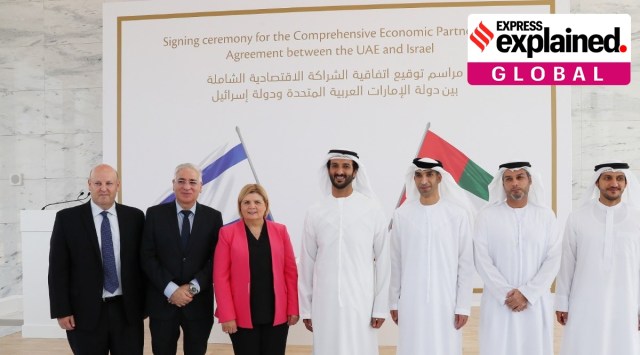Israel and the United Arab Emirates signed a historic trade agreement on May 31 with an aim to do trade worth more than $10 billion annually. The UAE is now the first country in the Arab world to have a free trade agreement with Israel.

What is the deal?
After the deal, tariffs will be removed or reduced on 96% of goods traded between the two countries. The UAE predicted the Comprehensive Economic Partnership Agreement would boost annual bilateral trade to more than $10 billion within five years. Trade was already at $1.2 billion in 2021, according to the Israeli data.
“Our agreement will accelerate growth, create jobs and lead to a new era of peace, stability, and prosperity across the region,” the Emirati trade minister, Thani al-Zeyoudi, said on Twitter.
The UAE has of late engaged in talks for similar accords with Indonesia and South Korea. It signed an agreement with India in February that eliminated duties on goods which account for 90% of India’s exports to the UAE by value.
How must the deal be viewed given the Gulf region’s history?
Story continues below this ad
The relations among countries in the region, particularly the Gulf, are shaped by multiple, complex factors – geopolitics over the control of oil and other valuable resources, rivalry between Sunni-majority Saudi Arabia and Shia-majority Iran, and the Israel-Palestine conflict.
The Israel-Palestine conflict has always cast a shadow on how nations in the region deal with Israel. However, there have been attempts at establishing peace. The 1993 Oslo Accord, signed by the leaders of Palestine and Israel in the US with the cooperation of Norway, was a landmark moment. Though it did not achieve success in ending the conflict, it led to a kind of thaw in relations between Israel and MENA (Middle East and North African) countries in both official and unofficial ways. Jordan signed its peace deal with Israel in 1994.
In a 2021 report by the Brookings Institute titled ‘The emergence of GCC-Israel relations in a changing Middle East’, it was noted how this still did not result in a domino effect because of the Arab world’s historic support for Palestine.
It noted that in 2002, Saudi Arabia led the Arab Peace Initiative, which outlined the principle of first establishing a Palestinian state and then normalising relations between the Arab world and Israel. But even in Saudi Arabia, this view is expected to soften due to the presence of Crown Prince Mohammed bin Salman.
Story continues below this ad
The Brookings report also says as per Abu Dhabi’s Crown Prince Sheikh Mohammed bin Zayed Al Nahyan, “The principal threats to the UAE and its allies are an expansionist Iran and transnational political Islamists.” Israel is seen as a formidable regional power that shares these views, so a better ties with it makes strategic sense. The promise of being closer to “the US strategic orbit” is an important factor too.
What has been noted by many is the speed with which that pact has been inked, coming just two years after Israel and UAE established official relations. The trade deal, observers say, points towards the changing priorities of Arab nations, and their willingness to engage with Israel despite the outstanding issues.
How sustainable are these ties?
Trade and cooperation has been growing, even as the UAE has simultaneously been critical of Israel’s actions towards Palestinians. In the summer of 2021, shortly after violence erupted in the Gaza Strip, Israel’s Foreign Minister visited the UAE in June to inaugurate the country’s embassy despite the UAE condemning the eviction of Palestinians by Israeli authorities in the lead-up to the violence.
Story continues below this ad
Al-aqsa Mosque has been a flashpoint often, with violence breaking out this year as well. The UAE foreign ministry on Monday again condemned “storming” of the Al-aqsa compound in Jerusalem by “extremist settlers under the protection of Israeli forces”, and then on Tuesday signed the deal with Israel.








































